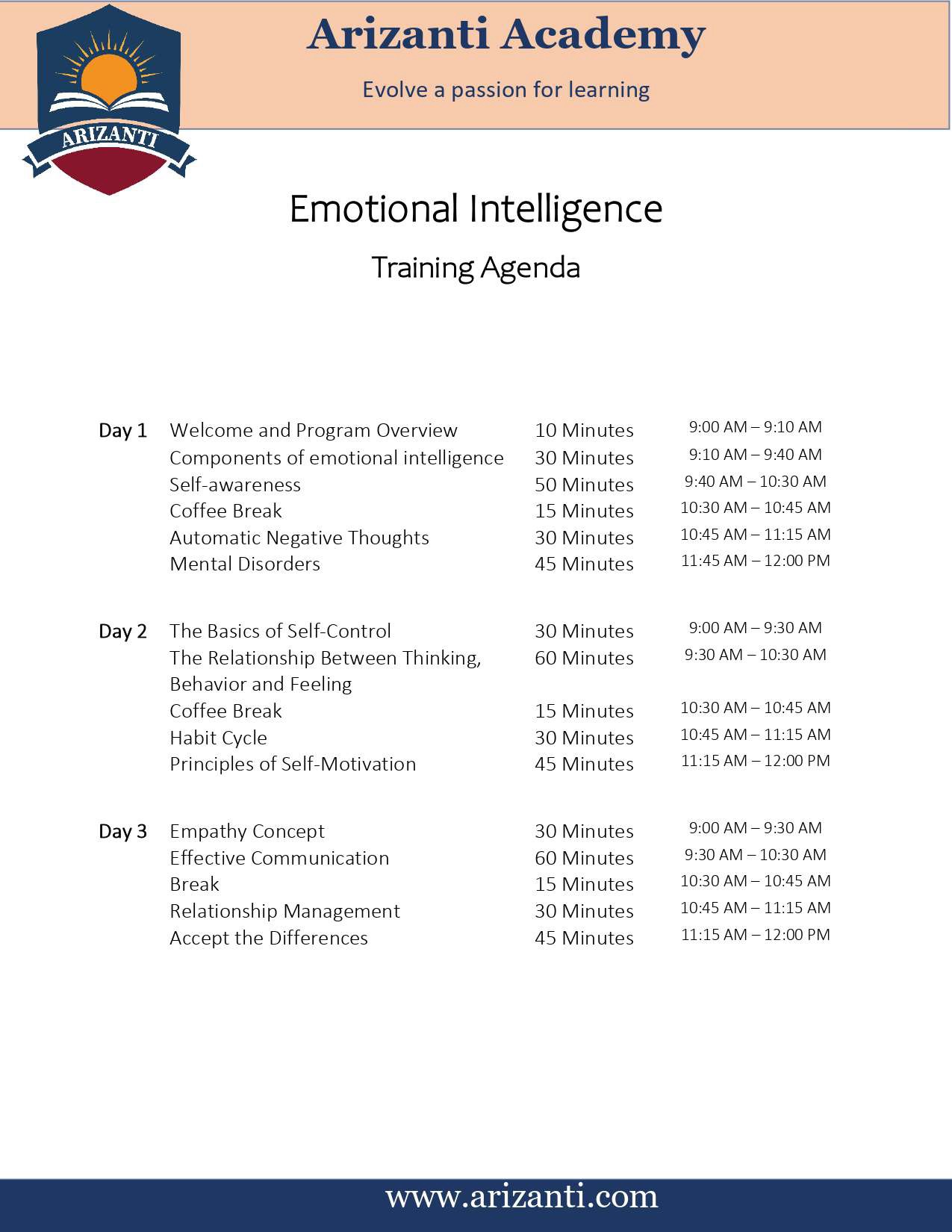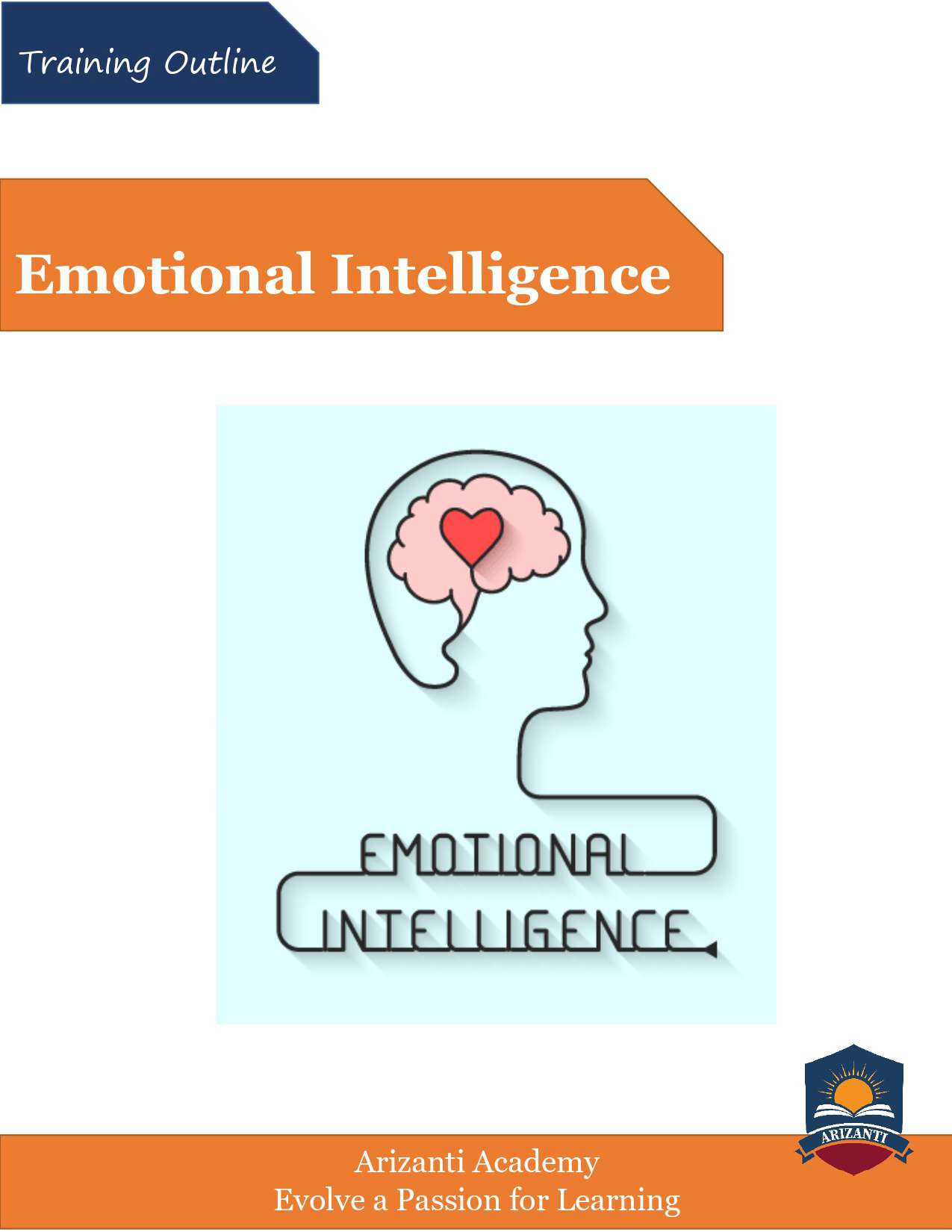By the end of this training, we expect the participants to have a deeper understanding of the importance of Emotional Intelligence skills through:
- Components of emotional intelligence and forms of empathy for others.
- How to develop emotional intelligence and realize its benefits and link it to the nature of workplace.
- Ways to acquire social skills and communicate with others successfully.
- Knowing and practicing self-management and accepting differences with others.
- Balancing optimism and pessimism and influencing others effectively.
- Happiness substances such as serotonin and dopamine.
Training Curriculum:
This unit deals with how to create a state of self-awareness and then describe oneself from a personal perspective as well as from the perspective of others using various tools and methods such as the (Johari Window) and the (EIT) Test. The program then provides an opportunity for participants to learn about the causes and roots of their daily behavior by learning about the concept of “Automatic Negative Thoughts”, identifying irrational beliefs, and understanding psychological disorders caused by irrational beliefs.
At the end of this day the trainees were able to have a better understanding of:- What do we mean by Emotional Intelligence?
- What does “self-awareness” mean?
- What does “self-describe” mean?
- Required skills, tools and means used to understand and practice self-awareness
- What are “Automatic Negative Thoughts”, and its impact on the formation of irrational beliefs.
- Types of Automatic Negative Thoughts and their impact on human behavior.
- Mental disorders resulting from irrational beliefs.
In this unit participants will learn how to change irrational beliefs (the logical aspect), break habits, and the dynamics of feelings by understanding the relationship between behavior, thinking and feeling. Participants will be introduced to the most important global theories used by psychologists to address this topic and how they could use by them in their personal lives and in the work environment. Participants will also learn to understand the mechanism of the cycle of human habits and how to seek to break it to get rid of negative habits and create new positive ones. During this day, the program will present some suggested solutions to confront mental disorders and reduce their effects. The basic principles of self-motivation such as the hormones of happiness and stimulation secreted by the brain and how to activate them, as well as the concept of delaying pleasure and building an excellent personal support team will be learned.
At the end of this day the trainees were able to have a better understanding of:- The basics of self-control.
- Skills required for mastery and self-management.
- The importance of changing the way of thinking and striving to change negative thoughts.
- Understand the relationship between thinking, behavior and feeling.
- The concept of cognitive behavioral therapy and how to apply it.
- Understand the dynamics of feelings and the cycle of habits and how to break them and develop new positive habits.
- How to deal with mental disorders.
- Principles of self-motivation.
- Happiness hormones and how to activate them.
- The technique of delaying pleasure and its effect on the process of self-motivation.
- Build an excellent support team
During this day, participants will learn how to develop their abilities to know and understand the feelings, emotions and emotions of others, and invest this knowledge to build effective and healthy social relationships in public life, and to control relationships, build and influence the work environment. During this part, the role of empathy skill in forming and sustaining relationships will be emphasized, and the importance of the effective use of body language in effective communication with others will be addressed. Some other important skills for managing relationships will also be discussed, such as the skills of accepting difference and resolving conflicts.
At the end of this day the trainees were able to have a better understanding of:- Understand the concept of empathy and its impact on communicating with others.
- Courtesy rules and effective communication.
- How to employ verbal and nonverbal communication skills in effective communication.
- Employing body language skill in empathy and effective communication.
- Accept differences, conflict management and teamwork.
Who should attend?
This program is necessary for anyone who wants to acquire the skills that make him able to know himself more deeply and use this knowledge by linking him to the nature and place of work and employing it to influence others effectively. Useful for employees and workers of various categories and positions.
A: Private training courses can be delivered in its location in (Villa No. R3/169, New Azadi-Atconz, Erbil/KRI) or outside venue booked by Arizanti Academy when there would be a need, or at your business premises.
Q: In which language the trainings are delivered?A: Our programs can be delivered in Kurdish, Arabic or English.
Q: What are your ideal training schedules?A: Half-day session: (09:00 am to 12:00 pm) or (2:00 pm to 5:00 pm) or to suit. Full-day session: (09:30 am to 15:30 pm) or to suit.
Our trainers are not only the most qualified professionally, but they are also the most capable of delivering information to the trainees. We rely on their selection, in addition to their high scientific specializations, on their experiences and personal abilities in implementing training programs of high value and positive returns, so that the training process does not become a mere waste of time and effort, but rather a real development of capabilities, skills and practical benefit acquired by our clients and their staff and practiced virtually to improve their overall performance.
In Arizanti Academy, we believe that accurate evaluation of training programs, based on scientific foundations and well-thought-out criteria, is the best way to achieve the desired goals of training, achieve maximum benefit from the program, and provide trainees with scientific knowledge, experience and practical skills. Therefore, we have built our evaluation systems based on accreditation and compatibility with a set of evaluation systems and international standards, where we rely in our work on: -
- Evaluation of the training program on the morning of the second day (if the program lasts for more than one day) to avoid any shortcomings in the program, and to achieve the objectives of the participants as groups and individuals.
- Participants' evaluation of the training material, the trainer, the place of training, training services and coordination on the last day of the program (this report is analyzed and the results are sent with the original evaluation sheets to the client with the final report).



